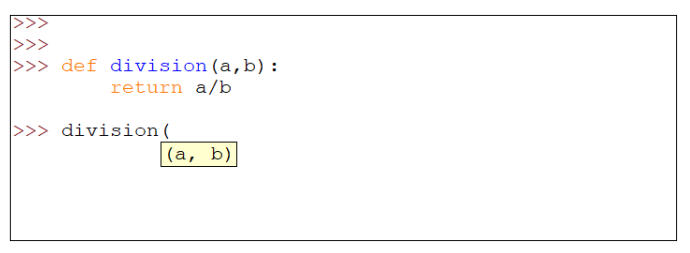
- FastAPI教程
- FastAPI - 主页
- FastAPI - 简介
- FastAPI - 你好世界
- FastAPI-开放API
- FastAPI - Uvicorn
- FastAPI - 类型提示
- FastAPI - IDE 支持
- FastAPI - 休息架构
- FastAPI - 路径参数
- FastAPI - 查询参数
- FastAPI - 参数验证
- FastAPI - Pydantic
- FastAPI - 请求正文
- FastAPI - 模板
- FastAPI - 静态文件
- FastAPI - HTML 表单模板
- FastAPI - 访问表单数据
- FastAPI - 上传文件
- FastAPI - Cookie 参数
- FastAPI - 标头参数
- FastAPI - 响应模型
- FastAPI - 嵌套模型
- FastAPI - 依赖关系
- FastAPI - CORS
- FastAPI - Crud 操作
- FastAPI - SQL 数据库
- FastAPI - 使用 MongoDB
- FastAPI - 使用 GraphQL
- FastAPI - Websocket
- FastAPI - FastAPI 事件处理程序
- FastAPI - 安装子应用程序
- FastAPI - 中间件
- FastAPI - 安装 Flask 应用程序
- FastAPI - 部署
- FastAPI 有用资源
- FastAPI - 快速指南
- FastAPI - 有用的资源
- FastAPI - 讨论
FastAPI - 类型提示
FastAPI 广泛使用了Python 3.5 及以上版本中提供的类型提示功能。事实上,Python 被认为是一种动态类型语言。这也恰好是 Python 的独特功能。在Python代码中,变量不需要声明为属于某种类型,其类型由分配给它的瞬时值动态确定。Python 的解释器不执行类型检查,因此很容易出现运行时异常。
在以下示例中,division()函数定义有两个参数并返回它们的除法,假设参数为数字。
>>> def division(a, b): return a/b >>> division(10, 4) 2.5 >>> division(10, 2.5) 4.0
但是,如果传递给函数的值之一恰好是非数字,则会导致 TypeError,如下所示 -
>>> division("Python",5)
TypeError: unsupported operand type(s) for /: 'str' and 'int'
即使是基本的编码环境(例如 IDLE)也表明该函数需要两个参数,但不会指定类型,因为它们尚未声明。

Python 的新类型提示功能有助于提示用户要传递的参数的预期类型。这是通过在参数后添加冒号和数据类型来完成的。我们将重新定义 Division() 函数,如下所示 -

请注意,在调用该函数时,Python 会提示要传递的每个参数的预期类型。但是,如果传递了不兼容的值,这并不能阻止出现 TypeError。在运行之前,您必须使用静态类型检查器(例如MyPy)来检查兼容性。
正如函数定义中的形式参数一样,可以为函数的返回值提供类型提示。在函数定义语句中的冒号符号之前(功能块在其后开始)添加一个箭头 (->) 和类型。

但是,如前所述,如果将不兼容的值传递给函数或由函数返回,Python 会报告 TypeError。使用 MyPy 静态类型检查器可以检测此类错误。首先安装 mypy 包。
pip3 install mypy
将以下代码保存为 typecheck.py
def division(x:int, y:int) -> int:
return (x//y)
a=division(10,2)
print (a)
b=division(5,2.5)
print (b)
c=division("Hello",10)
print (c)
使用 mypy 检查此代码是否存在类型错误。
C:\python37>mypy typechk.py typechk.py:7: error: Argument 2 to "division" has incompatible type "float"; expected "int" typechk.py:10: error: Argument 1 to "division" has incompatible type "str"; expected "int" Found 2 errors in 1 file (checked 1 source file)
第二次和第三次调用该函数时出现错误。第二,当需要int时,传递给y 的值是float 。第三,当需要int时,传递给x 的值是str 。(请注意 // 运算符返回整数除法)
所有标准数据类型都可以用作类型提示。这可以通过全局变量、作为函数参数的变量、函数内部定义等来完成。
x: int = 3
y: float = 3.14
nm: str = 'abc'
married: bool = False
names: list = ['a', 'b', 'c']
marks: tuple = (10, 20, 30)
marklist: dict = {'a': 10, 'b': 20, 'c': 30}
较新版本的 Python(版本 3.5 及以上)标准库中新增的一个功能是输入模块。它为相应的标准集合类型定义了特殊类型。类型模块上的类型有List、Tuple、Dict 和 Sequence。它还由联合类型和可选类型组成。请注意,数据类型的标准名称都是小写的,而打字模块中的数据类型的首字母是大写的。使用此功能,我们可以询问特定类型的集合。
from typing import List, Tuple, Dict
# following line declares a List object of strings.
# If violated, mypy shows error
cities: List[str] = ['Mumbai', 'Delhi', 'Chennai']
# This is Tuple with three elements respectively
# of str, int and float type)
employee: Tuple[str, int, float] = ('Ravi', 25, 35000)
# Similarly in the following Dict, the object key should be str
# and value should be of int type, failing which
# static type checker throws error
marklist: Dict[str, int] = {'Ravi': 61, 'Anil': 72}